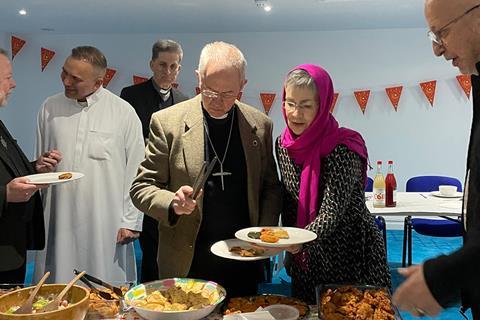Photos of the Archbishop of Canterbury attending an Iftar meal have caused controversy among some Christians. What is the significance of the meal that marks the end of a Muslim’s daily Ramadan fast, and should a Jesus follower ever go to one?

The presence of Ramadan in our everyday lives is seemingly increasing, especially in our big cities – from Islamic messages displayed on boards at train stations, to messages on big red buses, to news of our leaders and authorities attending mosques and other Islamic events.
Many people simply look at these signs and move on, others see it as a sign of growing diversity. But what about for us as Christians?
What is Ramadan and Iftar?
During the month of Ramadan, Muslims respond to the command to fast. It’s obligatory for all Muslims over the age of twelve. According to Islamic teaching, fasting provides an opportunity for Muslims to come closer to Allah, the end goal being the forgiveness of their sins. Muhammad himself stated that fasting expiates the sins of the past year. Another Islamic tradition says: “Whoever fasts a day in the way of Allah, Allah will move his face away from the Hellfire by a distance of 70 years.”
Iftar is the name of the meal eaten by Muslims to break their fast each day at sunset during Ramadan. Many Muslims will invite friends and neighbours to join them in these Iftar dinners, sometimes out of courtesy, often to share with them something of their religious beliefs. Several Islamic traditions teach that Muslims will be highly rewarded when they share their Iftar with others.
Should Christians attend Iftar?
If you’ve been invited to an Iftar, it’s likely there is already some connection between you and the person who’s invited you. This could be an opportunity to progress the friendship, to learn more about their religious beliefs and to share about Christ’s free gift of salvation.
I was grateful to be a guest at an iftar last week at Canterbury Mosque, and to have been welcomed with such kindness and hospitality. Especially at this difficult time, I’m inspired by the openness of so many Muslim communities during the month of Ramadan, and encourage… pic.twitter.com/KEARXaVckl
— Archbishop of Canterbury (@JustinWelby) March 19, 2024
Unlike Muslims, we have certain hope in our salvation
Ramadan overlaps with Easter, which can be a really good chance to talk about forgiveness, just like Jesus did in Luke 24:47: “repentance for the forgiveness of sins will be preached in his name to all nations.” The early followers of Jesus shared the same message, as Paul records in 1 Corinthians 15.
But let’s be real. We must also be careful to guard ourselves from inadvertently endorsing practises that honour false gods (see 1 John 5:21). In 1 Corinthians 8, the apostle Paul talks extensively about food sacrificed to idols and the freedom we have in Christ. In v8 he makes it clear that “food does not bring us near to God; we are no worse if we do not eat, and no better if we do.”
A message of hope
Islamic teaching states that Muslims live under the law, and need to earn favour from God through various rituals. But despite their fasting and prayer, there is still no guarantee that they will earn their salvation.
As Christians, we know the Bible teaches something different. Unlike Muslims, we have certain hope in our salvation, knowing that it isn’t what we have done that saves us, but what Jesus has already done. It seems fitting that this Ramadan, Christians are also celebrating the central point in our faith: Jesus’ death and resurrection.
In London alone, we know that one in two people are unlikely to know someone who can share that message of hope with them: many will be Muslims. It’s up to us to be the bearers of good news to our Muslim friends and neighbours.
Share Jesus
So if you find yourself invited to an Iftar, it’s a personal decision whether it’s right for you to go or not. Jesus ate with all sorts of people who were still figuring out who he was, so why shouldn’t we also eat with our neighbours and share stories of Jesus?
It’s up to us to be the bearers of good news to our Muslim friends and neighbours
Of course, sharing Jesus can be done in many different ways and at many different times. Why not return the invitation and have your Muslim friend over for dinner and speak to them about your own faith? Or invite them to an Easter or Christmas meal, a Christian festival or church service?
Ultimately, the Bible says that it is not those who fast, but those who have faith who are called righteous (Luke 18:9-14). So why not share that faith with a Muslim neighbour over dinner?
Find out more about sharing the gospel with your Muslim friends and neighbours at LCM’s Muslim Engagement Conference on 6 July




































4 Readers' comments